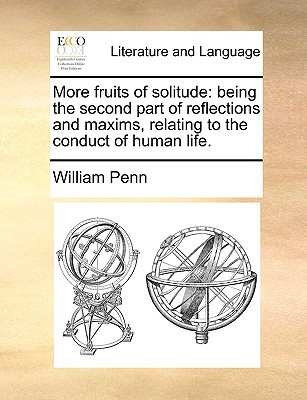- Biblia
- Leer la Biblia
- Versiones de la Biblia
- Verso del dia
- Planes de lectura
- Versos por tema
- Books of the Bible
- Imágenes De La Biblia
- Estudio
- Comentarios
- Concordancias
- Diccionarios bíblicos
- Enciclopedias bíblicas
- Sermones
- Bible Atlas & Maps
- BP Wiki
- Devocionales
- Devocionales de hoy
- Light of the World
- Todos los devocionales
- Inspirational Quotes
- Más
- Picture Quotes
- Videos
- Inspirador
- Estudio Bíblico
- Lo que dice la Biblia
- Bible Q&As
- Daily Bread
- Bible by Genre
- Bible Stories
- Random Bible Verse
- Comunidad
- Store
More Fruits of Solitude: Being the Second Part of Reflections and Maxims Relating to the Conduct of Human Life.
by William Penn
The 18th century was a wealth of knowledge, exploration and rapidly growing technology and expanding record-keeping made possible by advances in the printing press. In its determination to preserve the century of revolution, Gale initiated a revolution of its own: digitization of epic proportions to preserve these invaluable works in the largest archive of its kind. Now for the first time these high-quality digital copies of original 18th century manuscripts are available in print, making them highly accessible to libraries, undergraduate students, and independent scholars.
Western literary study flows out of eighteenth-century works by Alexander Pope, Daniel Defoe, Henry Fielding, Frances Burney, Denis Diderot, Johann Gottfried Herder, Johann Wolfgang von Goethe, and others. Experience the birth of the modern novel, or compare the development of language using dictionaries and grammar discourses.
++++
The below data was compiled from various identification fields in the bibliographic record of this title. This data is provided as an additional tool in helping to insure edition identification:
++++
British Library
T139391
Anonymous. By William Penn. In 'Some fruits of solitude', seventh ed., London [1735?], of which it was apparently published as the second part. With an index.
London: printed and sold by Luke Hinde, [1735?]. [6],111, [3]p.; 12
BUY NOW
Paperback, 126 pages
Published May 28th 2010 by Gale Ecco, Print Editions
Book Quotes
Suscribir
© 2025 Bibleportal.com Reservados todos los derechos.

William Penn was an English founder and "Absolute Proprietor" of the Province of Pennsylvania, the English North American colony and the future U.S. State of Pennsylvania. He was known as an early champion of democracy and religious freedom and famous for his good relations and his treaties with the Lenape Indians. Under his direction, Philadelphia was planned and developed.
As one of the earlier supporters of colonial unification, Penn wrote and urged for a Union of all the English colonies in what was to become the United States of America. The democratic principles that he set forth in the Pennsylvania Frame(s) of Government served as an inspiration for the United States Constitution. As a pacifist Quaker, Penn considered the problems of war and peace deeply, and included a plan for a United States of Europe, "European Dyet, Parliament or Estates," in his voluminous writings.
... Show more